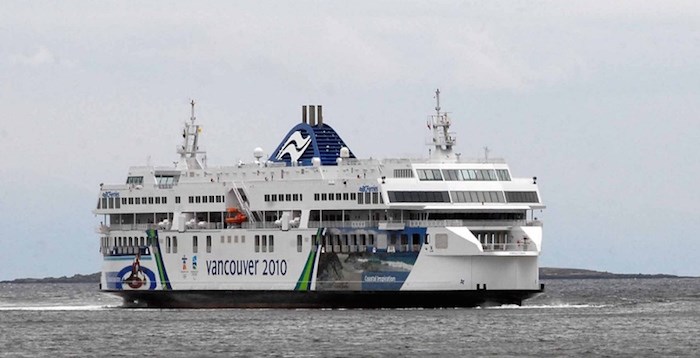 The Coastal Inspiration approaches Nanaimo. BC Ferries is known for their unreliable Wi-Fi service. Times Colonist file photo
The Coastal Inspiration approaches Nanaimo. BC Ferries is known for their unreliable Wi-Fi service. Times Colonist file photo
One of BC Ferries’ newest vessels broke down the other day, and passengers were OK with that. Delays? Just part of living on an island. Chill.
So how come the same people who calmly shrug it off when the Salish Raven turns a 40-minute crossing from Pender Island into a four-hour Gilligan’s Island cruise go off their nuts when the Wi-Fi fails?
Which is what came to mind while watching the Dalai Lama, frustrated by a dropped connection, fire his iPad into a bulkhead of the Coastal Perspiration.
Just kidding: It was a MacBook Pro.
People really do hate the ferry system’s wireless service, hate it the way Canucks fans hate Mark Messier.
If you’re in the cafeteria and some guy is pounding his keyboard like Ray Charles at the Apollo, snarling and moaning in a manner more commonly associated with shiny shoes and sidewalk dog crap, you know why: BC Ferries’ Wi-Fi sucks.
Its signal is weaker than Trump’s grasp of geography/reality/morality. Justin Trudeau and Andrew Scheer have a stronger connection.
It’s not as though B.C. Ferries doesn’t know this, or that it doesn’t care. People gripe and sputter about Wi-Fi more than they used to gripe and sputter about the Sunshine Breakfast, which is not fun for those who must field the spittle-enhanced complaints. The corporation’s website actually devotes a whole page to an explanation of why its wireless is less dependable than a $40 Rolex.
In a nutshell: it’s hard to provide Wi-Fi over water. You can’t just run a phone line or coaxial cable to a ferry. Instead, signals from land are transmitted to vessels by ship-to-shore radio.
The problem is that sometimes the signals get blocked by other ships, or islands, or by the steel hulls of the ferries themselves. Distance and radio interference weaken signals. Sometimes the Wi-Fi slows to a crawl when everybody tries to sign on at once.
BC Ferries could do like the airlines and cruise ships and get faster, more reliable Wi-Fi via satellite, but that’s expensive, which is why cruise lines charge for service that is still tear-your-hair-out slow.
Last year, the corporation mentioned something about considering a two-tiered option, where those who wanted a satellite-based connection would pay a fee while the paupers in steerage would continue to make do with the free existing version.
The website does talk about installing newer, beefier ship-to-shore radio technologies and building a network of shore-based repeater sites along major routes. The ferry service has also been working with Telus at some minor terminals, installing equipment to enable Wi-Fi this past summer.
None of this will placate those who demand free, uninterrupted, strong-enough-to-watch-Netflix connectivity, now. Tell them they’ll just have to stare at the passing postcard-perfect scenery for one hour and 35 minutes, or — sweet lord — read a book, and they’ll fix you with a stare that says: “What am I, Amish?”
In these passengers’ defence, not only does BC Ferries say it offers Wi-Fi, but it does so with no asterisk clarifying that the service might, like a 3 a.m.-in-a-rainstorm-taxi, not actually be there when you need it.
If you’re going to advertise a cheeseburger, it had better contain both cheese and a burger. Don’t tease people with the promise of Wi-Fi, only to deliver a bun with no meat.
On the other hand, what does it say about our sense of entitlement when we huff and puff in indignation when a transportation company fails to guarantee that Avengers: Endgame won’t stop streaming halfway through Active Pass?
Remember, it wasn’t long ago that communicating from the ferry meant lining up at the pay phones, quarters in hand, if you wanted to let someone know that you had made the sailing and were on your way (sometimes you would dodge long-distance fees by pre-arranging to have the person on the other end reject your collect call).
It wasn’t until 2010 that Wi-Fi was introduced on the Swartz Bay-Tsawwassen route. It came to the Horseshoe Bay-Departure Bay run a couple of years later.
If the innovation seemed Jetsons futuristic at the beginning, it wasn’t long before it felt horse-and-buggy dated. By 2017, we were so frustrated that the B.C. Liberals were dangling $1 million for improved ferries Wi-Fi as an election-campaign goodie. It seems the speed of technological change has diminished our sense of wonder and increased our expectations.
Chill.


